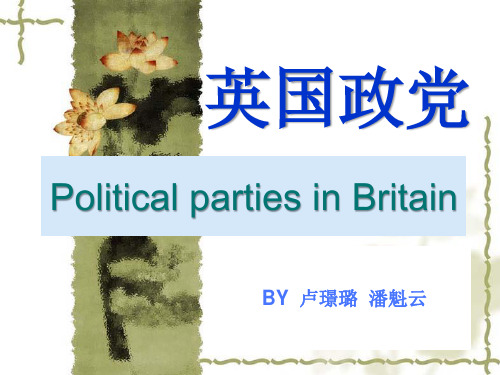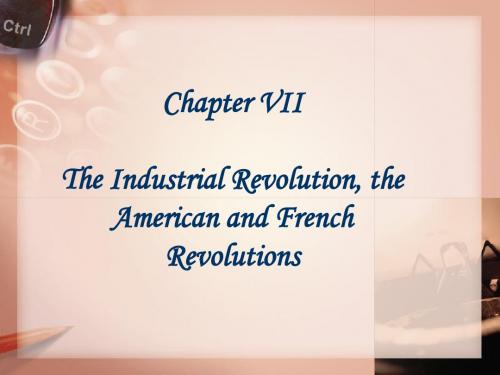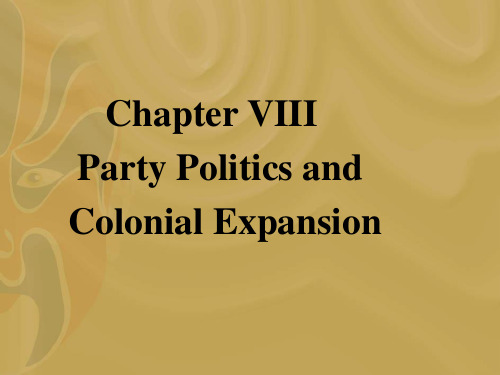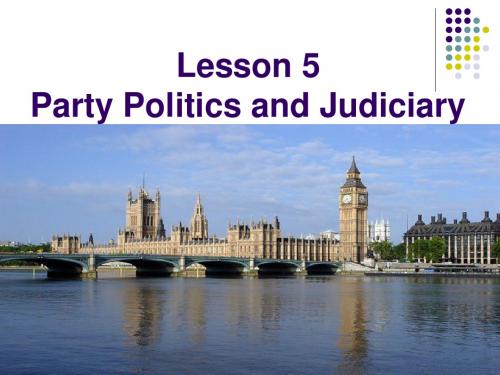chapter VIII party politics and colonial expansion英国概况
- 格式:ppt
- 大小:349.50 KB
- 文档页数:14





1)英国不是联邦制国家,而是单一制国家。
在单一制国家里,只有一个组织拥有职权,处理当地所有的事务。
2)它是君主立宪制和议会民主制的结合。
君主立宪是一种政体,君主作为国家元首,在宪法指导下处理事务,无论是成文的宪法还是混合宪法。
君主立宪政体有时被称为有限君主制、加冕的共和制或议会君主制。
3)在英国,国家元首是在位的国王或女王,政府首脑是首相,他是下议院多数党领袖。
The British constitution is only partly written. It is made up ofstatute law, common law and conventions(成文法,习惯法和公约). It is more flexible than the written constitution of other countries.1)组成:英国宪法只有一部分成文规定。
它是由成文法、习惯法和惯例组成。
它比其他国家的成文宪法更灵活。
the legislature, the executive, and the judiciary (立法,行政和司法).2)政府的主要组成部分:立法,行政和司法the lord chancellor(大法官) is a member of all three branches.He serves as a member of the cabinet (内阁)(executive branch), as the government’s leader in the House of Lords (上议院) (legislative branch), and as the head of the country ’s judiciary(国家司法体系)(judicial branch).3)机关之间的重叠:大法官同时任职于三个机关。
他是内阁成员(执行机关),担任上议院议长(立法机关)以及国家司法部门(司法机关)的领导。

理想国英文原文第七章理想国英文原文第七章内容如下:Book 7: The Role of CourageThe first task of our inquiry is to define courage and its purpose in the polis, for it is surely a kind of political virtue. The noblest form of courage is the warrior's spirit, but we must not confuse this courage with courage as a virtue of the city at large. It is no use that it is brave, for it does not make the city well-ordered or prosperous. Hence we must investigate how and under what conditions the citizen-farmer, who has both courage and self-control, can best serve the city and be his own best friend.But before we examine that question, let us assume that we are dealing with a perfectly ordered state and let us examine courage in itself and as relative to justice and injustice.This is a great book in the Republic, because it delves into the question of courage as it relates to character and ethics. It also examines how courage can be beneficial to individuals and society as a whole. The discussion of courage in this chapteremphasizes its role in maintaining order and stability within the community, and it argues that courage is not just the absence of fear but also the ability to face challenges and risks with confidence and determination.In conclusion, this chapter of the Republic explores the importance of courage from multiple perspectives, emphasizing its role in maintaining order and stability within society, as well as its connection to character and ethics. It serves as an excellent example of how Plato's thought on politics and ethics intersect, emphasizing the importance of virtue and character in achieving a just society.。
Chapter 7. The Eighteenth Century[The Age of Reason (1688——1798)]I. Historical backgroundAfter the Glorious Revolution, Whig and Tory were established. The former one represented the interests of the moneyed class, while the latter one represented the royalists.England fought many wars with France, Spain, etc. In those wars England rose as a victor making it the strongest country in navy and economy and considerably stretching its occupied land oversees extending from the west of Canada to the east of India.II. The special features of the cultural life at the timea. Political writings: the rise of the political parties led to the appearance of pamphlet wars of political writings attracting many writers to work for either of the parties or both alternatively.b. The rise of newspapers and magazines: the reason for the rise: ·Both parties had their respective ones to express their opinions. ·The rise of the middle class demanded entertainment and education and they need to express their views too.c. Coffeehouses:where people gathered to exchange ideas and thus they help to determine the literary trend of the timed. The new morality:·The emphasis on reason·The development of tolerance of different opinions in politics and religione. The influence of science and technology:·Principia Mathematica in 1687 by Newton (1642——1727) ·The new epistemology of John Locke (1632——1704)f. French influence——Augustanism——neoclassicism stressing to learn from the classicals*What is classicism?The characteristics in Greek and Roman classical works. They are clarity, logic, form, proportion, balance with each other, parallelism, restraint.III. The characteristics of neoclassicism1.Reason rather than emotion and form rather than content were emphasized.2.Most of the writings at the time were didactic and satirical.3.The closed couplet was the only possible verse form for serious work for elegance, correctness, appropriateness and restraint were preferred.4.It is exclusively a “town”poetry, catering to the interests of the“society”in great cities. The humbler aspect of life are neglected and it showed in most part no love of nature, landscape, or country things and peoplecking romantic elements and being hostile to medieval literature6.An age of prose, especially the latter part the centuryIV. Representative authors of the time1. Daniel Defoe2. Jonathan Swift3. Joseph Addison4. Alexander Pope5. Samuel Johnson6. Henry Fieldding7. Thomas Gray8. Thobias George Smollet9. Richard Brinsley Sheridan10. Robert Burns11. William Blake1.Daniel Defoe(1661—1731)a pioneer novelist of England and also a prolific writer of books and pamphlets on a great variety of subjects.1)his life story:a.from a dissenter’s family: Presbyterian butcherb.having a questionable character in politics, but strong belief in religious freedom2)his literary achievements:·fiction:Robinson , Crusoe , Moll Flanders·contribution to journalism & regulating English trade methods and principles3) characteristics of his fiction:a.Robinson Crusoe:(1)based on real experience of a Scottish sailor but combinedwith his own imagination, it is still a fictional work.(2)using the picaresque frame with a story in the shape of a journal and having strong sense of journalistic truth; containing serious wisdom of life(3)The importance of the hero:i. typical of the rising English bourgeois class, practical and diligent with a restless curiosity to know more about the world and a desire to prove individual power in the face of social and natural challengesIi. a real hero of middle class different from the hero of knights orepic hero(4)moral teaching: sing praise of labour, presenting it as the source of human pride and happiness as well as a means to change man’s living conditions from desperation to prosperity(5)limitations:i. praise colonization overseas through the relationship with Friday ii. his attitude to woman is open to criticismiii. Praise slaveryb. Moll Flanders:(1) its story(2)the significance, one is for the first a woman being the protagonist; artistically more mature than Robinson: better structure and better plot; so it is written in an autobiographical form called a memoir2. Jonathan Swift(1667-1745)a churchman and also a university graduate who viewed human society with contempt and has been called a cynic and even a misanthrope.1)his life story:His father died before he was born, and he had to accept the aid of his relatives and finished his study at Dublin University.2)his literary achievements:a.satirical essays:The Battle of Books(1696-1698), A Tale of the Tub(1696-1698)b.Writings in pamphlets:The Draiper’s Letters, A Modest Proposac.fiction:Gulliver’s Travel(1726)3)characteristics of his pamphlets:·Gulliver’s Travela. criticizing the oppression and exploitation of the Irish people by the absentee landlords and the English government.b. using bitter satire·The battle of Booksa debate happening 18th century. Some people modern people ·The Tale of the Tuba satire on various religious sects: Catholic, Anglican and dissenters’churches: changes done by different churches to the Christian doctrines·The Draiper’s Lettersrevealing the corruption and license, debased·A Modest Proposala satire on the English government’s heavy exploitation4)A Modest Proposala.It is a bitter satire on the policy of the English government towards the Irish people.b.Swift in this article suggested to the Irish people that the best way to end their misery was to produce children and sell them at market as a delicious dish for the rich.3. Joseph Addison(1672-1719)and Richard Steele(1672-1729)1) their life stories: they were born in the same year, attended the same school and later studied at the same university.they had the same political trend——whig2) their literary achievements:Joseph Addison & Richard Steele·Joseph Addisonstarted the periodical essays that were the most characteristic genre of 18thcentury literature.·Richard Steelecontribution to the periodicals:The Tatler, The Spectator, The Guardian3)characteristics of their periodical essays:a.Methods:d, indirect, was admirably adapted to their purpose.2. were full of wit, humor, and satire.b. Themes:dealt with1)light topics-fashions, head-dresses, practical jokes,2)polite conversations, discussed art, philosophy, drama, and poetry, and sought in so doing not only to interest the general reader in such subjects, but also to guide and develop their tastes.3) deeper topics such immoralityOne other characteristic: draw some images of some typical middle class people:C. Style: simple language familiar to the middle men; graceful, poised, well balanced, familiar words and expressions to the readers,4)Aims of their writing:a.to educate the newly risen middle class.b.to bridge the gap between the small circle of London elegance and wit,and the large, serious, rather Puritan middle class.5)two selected pieces written by Addisona. The Royal Exchangeb. Sir Roger at Church4.Alexander Pope(1688-1744)1) his life story:·he was self-educated.·he worked hard against poor health and unfavorable conditions and gained a profound knowledge of both the classics and the craft of writing.2)his literary achievements:·An Essay on Criticism, The Rape of the Lock, An Essay on Man ·Contribution to poetry in heroic couplets3)characteristics of his poems:a. succeeded Chaucer and Dryden in bringing metrical form to its perfection.b. contained a great number of quotable lines that have passed into everyday speech as popular sayings, such as :“To err is human, to forgive divine”, and “For fools rush in where angels fear to tread.”c. limitation: Pope is never profound in thought, so the poems lack original ideas5.Samuel Johnson(1709-1784)the greatest English man of letters between Pope and Wordsworth. 1) his life story:·he was born in a book seller’s family.·he was conservative in his world outlook and was against any kind of reform or innovation.·he upheld tradition and authority. Uphold conventions authority2)his literary achievements:·A Dictionary of the English Language·Contribution to a periodical, The Rambler,·Known for essay; his Preface to his edition of Shakespeare and The Lives of the Poets3)characteristics of his writing:Emphasizing the specification of language6. Henry Fielding(1707-1754)playwright, novelist and district law magistrate, came from an aristocratic background1) his life story:·was born to an upper-class family·began writing plays while at university and took it as his profession after leaving school.2)his literary achievements:novels:The History of the Adventures of Joseph Andrews,The History of Tom Jones3)characteristics of his novels:a. The History of the Adventures of Joseph Andrew( 1) its story and significance(2)in his preface to this novel Fielding proudly announced that he had created a new genre called comic epics in prose and discussed its characteristic feature.(3)the novel turned from a novel of seduction into one of the first exemplars of the great English panoramic tradition, which was to reach new heights later in Thackeray and Dickens.b. The History of Tom Jones(1) its story(2) Its significance:a. the understanding of allegory in the storyb. to Fielding, the countryside represents the basic goodness of human race, whereas the city stands for evil and sin.Tobias George SmollettA general introductionTobias George Smollett (19 March 1721 –17 September 1771) was a Scottish poet and author.He was best known for his picaresque novels, such as·The Adventures of Roderick Random (1748),·The Adventures of Peregrine Pickle (1751), which influenced later novelists such as Charles Dickens.·His last novel, the best novel is The Expedition of Humphry Clinker(1771), published in the year of his death.7. Thomas Gray(1716-1771)one of the representative poets at the time1) his life story:was born in London and educated at Eton and Cambridge, where he, after a grand tour on the continent, spent the rest of his life.2)characteristics of his poems:·more natural and spontaneous in thought·emphasizing emotions and sentiments3)The Elegy Written in a Country Churchyard8. Richard Brinsley Sheridan (1751-1816)1) his life story:was born in Dublin, of Irish origin, and was educated at Harrow.2)his literary achievements:drama: The Rivals, A Trip to Sarborough, The School for Scandal3)The School for Scandala. its story and significanceb. it is written in the tradition of Comedy of Manners, and exposes the immorality, hypocrisy, money-hunting, and scandal-mongering of the idle classes in 18th century England.9. Robert Burns(1759-1796)1) his life story:was born in Scotland in a poor peasant family and educated himself through selfstudy.2)his literary achievements:poems and songs3)characteristics of his poems and songsa.written in the Scottish dialect and in the tradition of Scottish folk songs.b.besides love lyrics, most of his poems and songs are about patriotic and political themes.10. William Blake (1757-1827)a poet as well as an engraver.1)his life story:was born in a hosier’s family in London and drew pictures and engraved to illustrate his works and the works of others.2)his literary achievements:·poems:Poetical Sketches, Songs of Innocence,Songs of Experience, Prophetic Books·broke with the neo-classical tradition both in form and in content3)characteristics of his poemsa. Songs of Innocence(1) expressed the poet’s delight in life,even in the face of sorrow and suffering.(2)the world is seen through the eyes of a child’s imagination which can be attained by adults if they cast away the follies and deceits of the hostile world and seek a visionary world through their imagination.b. Songs of Experience(1) the atmosphere is no longer sunny but sad and gloomy, and evil is found everywhere in this world.(2) through the loss of imagination, man has become a slave to the falsehood and hypocrisy of religion and society, and thus has lost the Heaven of Innocence and gained the Hell of Experience.c. the contradiction of these two poem collections。
---------------------------------------------------------------最新资料推荐------------------------------------------------------ 英语国家概况(谢福之版)总复习资料.The United Kingdom of Great Britain andNorthern IrelandChapter 1 Geography, People and Language全名: the United Kingdom of Great Britain(大不列颠联合王国)and Northern Ireland (北爱尔兰) . 由成千上万的小岛组成(the British Isles). 两大岛屿:Great Britain(大不列颠) and Ireland (爱尔兰)The River Thames (second longest and most important),originates(起源于)in southwestern England -----North Sea. Scotland ( Edinburgh 爱丁堡) important river:Clyde River kilts(苏克兰小短裙) Wales( Cardiff 加迪夫,著名港口).The Severn River is the longest river of Britain------flow through western England. Northern Ireland (Belfast 贝尔法斯特,首府)Lough Neagh----the largest lake in the British Isles. Climate: temperate, with warm summers, cool winters and plentiful precipitation(降雨量),冬暖夏凉,降雨充沛 Three major features: winter fog, rainy day, instability 冬天多雾,常年多雨,天气不定 London---Buckingham Palace(白金汉宫), Guildhall (市政厅),St. Paul’s Cathedral(圣保罗大教堂), The Tower Bridge of London(伦敦塔桥) The majority of the population is descendants of the Anglo-Saxons, a Germanic people from Europe. 大部分的人口是盎格鲁-撒克逊人的后裔,从1/ 18欧洲来的日耳曼人Most people in Wales and Scotland are descendants of the Celtic people, including the Irish people 威尔士和苏格兰的大多数人都是凯尔特人的后裔,包括爱尔兰人English belongs to the Indo-European family of languages. English is in the Germanic group.英语属于日耳曼语语系Germanic group: East Germanic, North Germanic, West Germanic. English evolved from the West Germanic group.日耳曼语系:东日耳曼语,北日耳曼语,西日耳曼语。
新世纪研究生公共英语教材阅读B课文原文及翻译Unit1Party PoliticsJudith Martin1. Etiquette at an office party? Why, these people have been socializing happily every working day of their lives, give or take a few melees, rumors, and complaint petitions. All it takes to turn this into holiday merriment is a bit of greenery looped around the office—the staff will soon be looped, too. Surely it is enough that the annual Christmas party has the magic ingredients: time off from work, free food and drink, and a spirit of fun replacing such ugly work realities as sexual harassment.2. Furthermore, partygoers figure, it offers relief from such pesky obligations as thanking anyone or being kind to wallflowers because there really aren‟t any hosts. Nobody has to pay (that same Nobody who generously provides the telephone line for long-distance personal calls), and so nobody‟s feelings need be considered.3. This is all pure hospitality—there for the taking, like the office-supplied felt-tipped pens everyone has been pocketing all year. Out of the natural goodness of its corporate heart and the spirit of the holiday season, the company wishes only to give its employees a roaring good time, and the employees, out of loyalty and the thrill of getting to know their bosses off-duty as equals, delight in the opportunity.4. For those still dimly aware of the once-standard give-and-take of real social life, this no-fault approach to business entertaining seems a godsend. In the now-rare domain of genuine society, hosts are supposed to plan and pay for the entertainment of their guests, on their own time and in their own houses. Guests have strict duties, as well—from answering invitations to cooperating with all arrangements, even to the extent of pronouncing them perfectly lovely.5. Business entertaining appears to remove the burdens of time, effort, money, individual responsibility—and the etiquette connected with them. The people who do the planning are paid for their trouble, so those who benefit need not consider they have incurred a debt. Why, the annual Christmas party ought to be an inspiration to lower-level employees to work their way into realms where company-sponsored partying can be enjoyed all year long.6. Not so fast. Flinty Miss Manners does not recognize any holidays from etiquette. (Employees, if not employers, should consider themselves lucky that she is only on the Party Committee, not the one that might take up ethical questions about those pens and calls.) Office parties differ from private ones but are no freer from rules.7. If it were indeed true that everyone has a better time without etiquette, Miss Manners could easily be persuaded to take the day off. But having long served on the Office Party Etiquette Cleanup subcommittee, she is aware that things generally do not go well when there is no recognized etiquette and everyone is forced to improvise.8. Let us look at all this spontaneous, carefree fun: There being no proper place for the boss, he or she hangs around the door, concerned about mixing with everyone. It might discourage hospitable bosses to see guests staring at them in horror and then slithering in by a side door. But etiquette‟s solution of having everyone greeted in a receiving line was rejected as too stiff. So one can hardly blame employees for recalling a long-ingrained principle of the workplace: Seeing the boss and having a good time are best not scheduled at the same time.9. Desperate to make the time count, the boss grabs the nearest available person and startsdelivering practiced words about the contribution he makes to their great enterprise. The reaction is not quite what was hoped for. Discreet questioning establishes that this is an employee‟s guest. He doesn‟t work for the company, recognize the boss, or appreciate the attention—and, as a matter of fact, has only a passing acquaintance with the employee who issued the invitation. What this guest wants is not professional fellowship but a fresh drink, if the boss would kindly step out of the way.10. Now, the reason the invitation said “and guest” was to avoid the ticklish issue of who is still married to whom and what the spouse calls itself. Last year, unmarried employees were furious when their partners were not included, and married employees complained that the forms by which their spouses were addressed were offensive: “Mrs.” offended women who preferred “Ms.,” and wives who had the same surnames outraged everybody who didn‟t. This year, the complaints will be from spouses who were not told that there was a party or who were told that spouses weren‟t invited—but found out otherwise. There won‟t be many complaints. They will, however, be memorable, darkly charging the company with promoting immorality.11. Meanwhile, what about those who are interested in promoting a bit of immorality, or just plain romance, of their own? They, too, are creating problems that will reach far into the new year. True office romances are the least of them, with their charges of favoritism and melding professional and personal time. More serious is the fact that, in spite of the liquor and high spirits, it still counts as sexual harassment when anyone with supervisory powers makes unreciprocated overtures to a lower-ranking employee. And foolhardy when a lower-ranking employee annoys a higher-ranking one.12. Some employees have their minds only on business and will be spending party time actively promoting workaday concerns. Remembering the company rhetoric about open communications and all being in this together, they will actually seek out the boss, who by this time is grateful to be addressed by anyone at all.13. But they do n‟t want to engage in platitudes. They accept compliments with: “Well, then how about a raise?” They plead for promotions, explain confidentially who ought to be fired, and advance previously submitted ideas about revolutionizing the business that have been unaccountably unappreciated for years. In one evening, they manage to cut through the entire hierarchy and procedures the boss has painstakingly established for the purpose of being spared this kind of importuning.14. Eventually—usually somewhat late in the party—it occurs to someone that this informal setting is just the time to offer the boss some constructive personal criticism. What else does talking frankly and informally mean but an invitation to unload opinions without any career consequence?15. Here is where the company has pulled a fast one on its employees. “Go ahead,” it has said, “relax, have a good time, forget about the job.” And the naive have taken this at face value. This event is called a party—a place where one lets loose without worrying about being judged by the cold standard of professional usefulness.16. Even employees who adhere strictly to standard business dress in the office may not know what the bosses might consider vulgar in evening wear. Here is a chance to show off their racy and imaginative off-duty clothes. But over there are supervisors murmuring that people who look like that can‟t really be sent out to represent the company.17. Worse are the comments on anyone whose idea of fun is a little boisterous. It may be just thebehavior that makes one a delight—or a trial—to one‟s friends. But here, it is not being offered for the delight or tolerance of friends. It is being judged on criteria other than whether the person is a riot.18. It is not that Miss Manners wants to spoil the office party by these warnings. She just wants to prevent it from spoiling careers. And the solution is what was banished from the party for being too inhibiting: etiquette.19. The first formality that must come back is inviting everyone by name. The practice of merely counting every invitation as two is as dangerous as it is unflattering. But people who have been clearly identified and told that they must respond—the suggestion must be made neutrally, to show that the party is a treat, not a requirement—already have some sense that they are both individually sought after and expected to be responsible.20. What constitutes a couple is a murkier question than Miss Manners and any sensible employer ought to investigate, but employees simply can be asked to supply the name of a spouse or friend they want to invite. (An office party can be limited by confining it to employees, in which case it should be held during office hours. But inviting spouses and such is better. Having to work is enough distract ion from one‟s more intimate relationships, and the staff was not compiled like a guest list, according to personal compatibility.21. Since we have established, Miss Manners hopes, that the point of an office party is not whooping it up or telling people off, what is it? It is showing appreciation of the staff.22. This starts with a well-run receiving line. However much popular opinion may regard receiving lines as nasty ordeals, they were invented to be, and remain, the easiest way to get everyone recognized by the key people. The oldest receiving-line trick in the world still works: Someone whose business it is to know everyone—or someone unimportant enough to be able to ask each guest his name—announces the guests to the host as they go through the line. The host can then scornfully declare: “Of course I know Annette. We couldn‟t run this place without her.” For extra charm, the employee‟s guest is also told how wonderful that employee is. This always seems more sincere than straight-out flattery, and from then on, whenever the employee complains that everyone at the office is an idiot, the spouse will counter by repeating that appreciation.23. It is often erroneously assumed that the style of the party ought to be what employees are used to: their own kind of music, food, and other things the executive level believes itself to have outgrown. Nonsense. What employees want is a taste of high-level entertaining. This may vary greatly according to the nature of the business. If, however, the party is too formal for the employees‟ taste, they‟ll get a good laugh and enjoy the contrast all the more when they continue partying on their own afterward.24. The clever employee will dress as the executives do, keeping in mind that there are few fields in which people are condemned for looking insufficiently provocative. Refusing or limiting drinks is not the handicap at business parties that it may be under the overly hospitable eye of a private host. And the real opportunity for career advancement is not petitioning a boss but rescuing one who has been cornered or stranded, thus demonstrating that one knows how to talk charmingly about nonbusiness matters.25. At the end, there is another receiving line. That is, the bosses plant themselves conspicuously by the exit, grabbing the hand of anyone trying to get away and thanking him for coming. Even the dimmest guest will then realize it is appropriate to thank back—that is, to realize that something has been offered and deserves gratitude.26. After all, isn‟t that why the office Christmas party is given?27. If the only goal were for the company to show the staff its appreciation, this could be effectively done with a day off and a bonus to go with it.第一单元晚会之道朱迪丝•马丁1. 办公室晚会礼节?有这个必要吗?员工们每天开开心心地彼此交往,虽然时不时会推推撞撞,发生点儿口角,传播点儿谣言,或是联名写点儿投诉信。